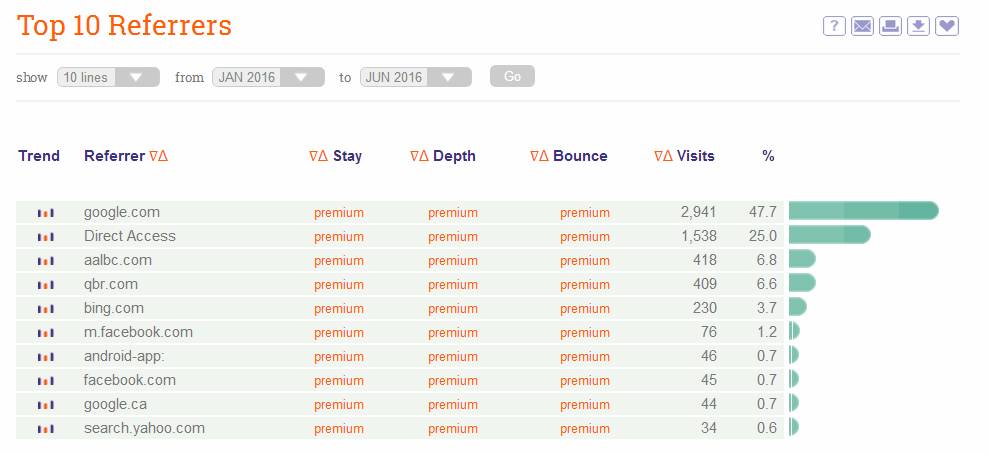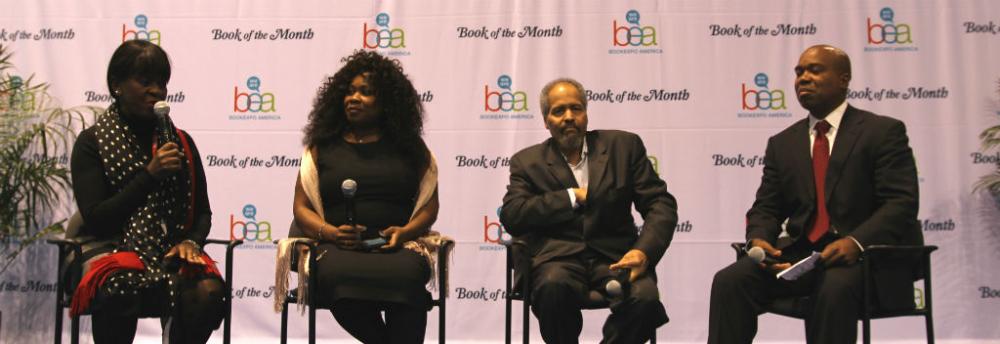Leaderboard
Popular Content
Showing content with the highest reputation on 06/18/2016 in all areas
-
This morning I was researching the 2016 Wheatley Book Awards on the Harlem Book Fair’s website and saw a big “Web-Stat Traffic Analysis” button at the bottom of the page, intrigued, I checked it out. The chart above shows the top 10 sources of traffic to the Harlem Book Fair’s website. As you can see AALBC.com has provided the Harlem Book Fair with almost 7% of all of their traffic for 2016, more than all of their social media combined. The chart shows that, on average, I’m sending just under 3 visitors a day to their site. That might not sound like a lot, but if AALBC.com disappeared today, the Harlem Book Fair site would immediately lose 7% of their traffic. This is EXACTLY why are our websites struggle. Multiply this effect across all of the other Black book sites that have closed and previously sent traffic to the Harlem Book Fair’s site, and it becomes clear how this lost traffic adds up. The refferal traffic lost to sites like The Harlem Book and AALBC.com has been significant. Yesterday, I shared a graph that shows how my referral traffic has dropped from 12% in 2014 to 3% in 2016. But it gets worse... It is not just that fact that we have FEWER Black websites who would potentially link to our sites. The ones that remain simply do not link to each other as much as they used to. I noticed this trend a few years ago and have written about it to the point of exhaustion. Many of the these sites, particularly the larger ones, have brought into the myth propagated by corporations that linking other websites is bad for one’s website. For course the alternative solution these corporations have offered is to actively participate and buy advertising on their platforms—otherwise known as social media marketing. Today virtually all of the sites, including the Harlem Book Fair’s site, that have stopped linking to other Black sites now, enthusiastically, link to social media sites. I have failed to see a single instance where, and no one has ever demonstrated that, the traffic lost from referrals from other websites has been made up by social media. Unfortunately this point fails to resonate with people because; they have completely bought into the social media hype, they have no historical perspective from which to draw, or they have simply not looked at their own web site’s traffic over time. It is also worth pointing out that the exchange of links between the Harlem Book Fair’s site and AALBC.com is not an equal exchange on any level: AALBC.com has gotten more visitors, in one day, than the Harlem Book Fair has gotten all year. The benefit is derived when all sites, large and small, are engaged in the activity of linking to each other. If that was not depressing enough... Why did I stop covering the Harlem Book Fair’s activities? Honestly, it is because of a lack of reciprocation. If you run a search for AALBC.com on the Harlem Book Fair’s website you get NOTHING in return. However run a search for the Harlem Book Fair on AALBC.com and you get over 400 results! When I attend the Harlem Book Fair, shoot video, post the award winning books, and much more; this takes time, money, and energy. I did this because I enjoyed the fair and it provided great content for the website. But there many other events I can enjoy and generate content from AND receive the needed reciprocation—a simple link to my site will do. In today’s environment I have to be more conscious and strategic about the events I choose to invest my time in. Finally there is hope! Linking to other websites works adds value to your website. I’m not saying link to any site without discretion. What I’m saying is don’t let some corporation stop you from linking to another website, because you think it will hurt your search engine rankings or will send visitors away from your site. When someone visits AALBC.com and discovers another website they enjoy; I have provided a valueable service and most likely earned a repeat visitor. As a result, I have always linked to other sites I think are valuable—even if they never return the favor. In the case of the Harlem Book Fair, I used to share information on the Wheatley Awards, but stopped in 2013; my efforts were better directed to other activities. However, my new website design allows me to more easily add lists of books, so I decided to begin sharing the Wheatley Awards again. The value proposition in providing information about these award winning books to my visitors is worth the lack of reciprocation. Plus the web would be a less rich place if the Harlem Book Fair’s site went away or migrated to Facebook. Please link to other sites you find valuable, not just because it makes the World Wide Web a better experience, but because it will make your site more valuable which is critical to your site’s survival over the long term.1 point
-
Well to be clear while I recognize how lists attract visitors; I'm not interested in building list solely for that reason, and I'm definitely not interested in creating lists for the sake of having people click through multiple pages to see each item on a list--I hate sites that do that. (I'm not suggesting that you were saying this Chris, I'm clarify this for other readers who may not know this) I use list in the in the content of aggregating information about books. For example take a look at the page for Jacqueline Woodson's Brown Girl Dreaming, you'll see that the book has been recognized in a variety of ways, bestsellers lists, awards, book club reading lists I think this is where the real value lies it helps readers find good books. I actually was not familiar with UPROXX until now. Honestly I'm not interested in replicating their model--though I can see why it would be much more lucrative than what I'm doing. You'll notice the site is much harder to navigate due to the prominence and positioning of ads.1 point
-
Post the video here when you get a chance Chris. I still have not had a chance to watch the video from the Uber conversation, maybe I grab a notebook and watch these in one shot. I forgot to mention the other reason I'm hopeful is that more and more people are coming to this conclusion on their own, and I have seen immediate benefits; we just have not reached a tipping point. I'd image the situation is similar in the Sneaker and Music business huh? How do you keep track of some many different industries?1 point
-
Thanks @CDBurns This discussion forum, in general, is not a major driver of traffic to his site. I think it should be, and could be, but for now social media owns that space. That said, two popular pages on this site for May (shown below) are here on the forums. Over 1,500 people who visited "The 10 Best Damn Websites Period" post and spent on average 6 minutes of the page. Even though there is not much conversation on these pages they are read frequently. The overall driver to the site is content related to books. The lists are very popular including the various bestsellers lists, children book lists, etc. These pages are far more popular than anything on the discussion forums. The articles I've written about the clousre of bookstores are very popular: http://aalbc.com/blog/index.php/2014/03/31/54-black-owned-bookstores-remain-america/index.html Even through this article was written over two years ago, it consistently bring at least a thousand readers a month often many more. But other sites link to this article and as discussed referral traffic is a key to our collective survival, though it is a tool few of us use.1 point
-
Photo Credit: Regina Brooks African-American women hit the books because it’s a way to spark a conversation, and to learn, validate, and share, says Lloyd-Sgambati: “You have to remember that not so long ago, it was punishable by death for an African-American to read, mainly because white society feared the spread of knowledge. Now many readers think, ‘I am doing this for my ancestors.’ My mother had eight children, but she ended every day by reading a book. It’s a large part of the African-American tapestry of their lives. It’s a myth perpetuated that they don’t read.” It’s not just African-American women who are reading, says Johnson. The men are also hungry for something that speaks to their lives. “It is not clear to me that men are reading less, but they are reading differently,” he says. “Women are more likely to get together and talk about books and go to readings. Those types of things are more visible, but that doesn’t mean men aren’t reading and exploring as well.” Read the complete article at Publisher's Weekly.1 point



